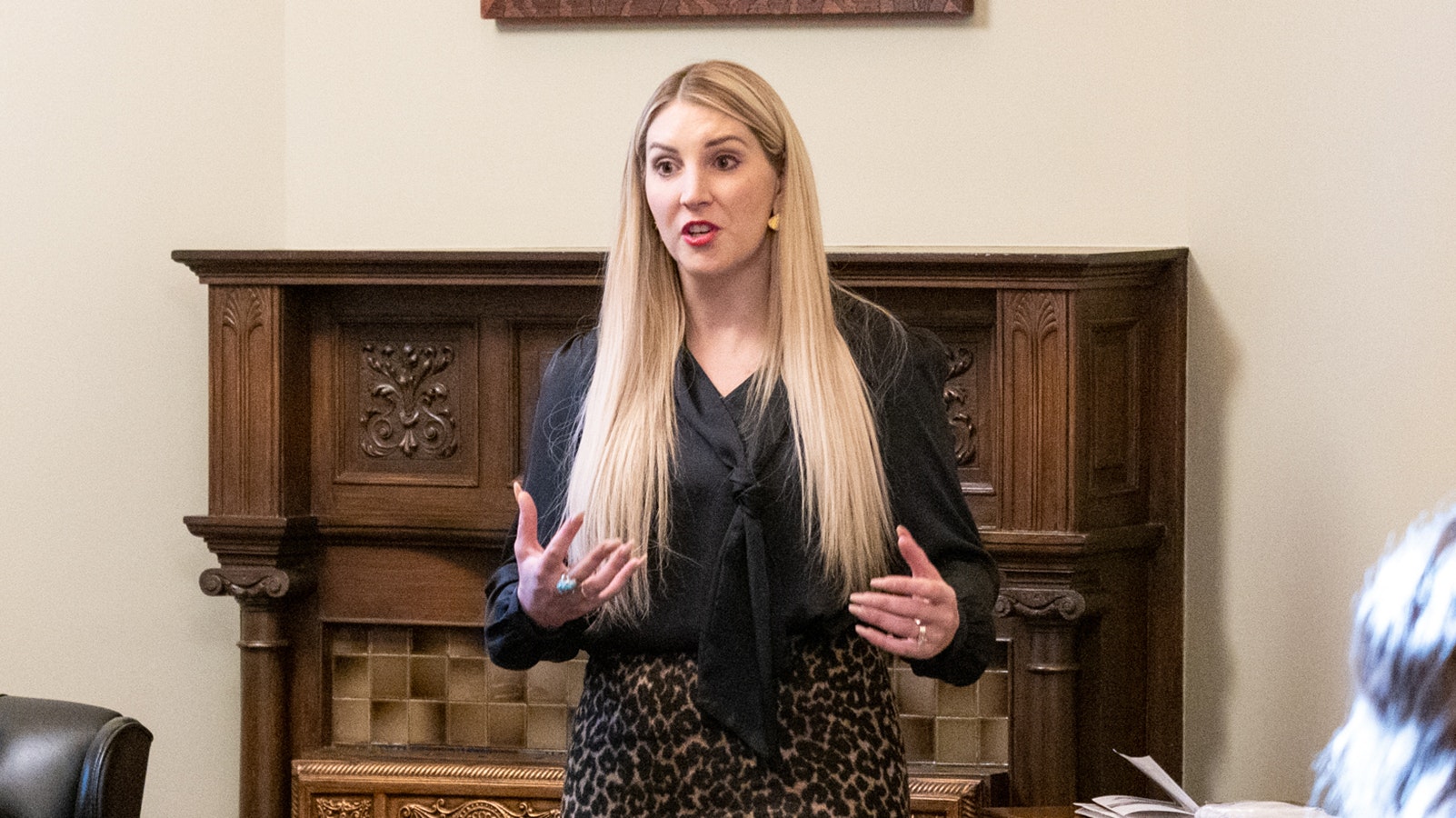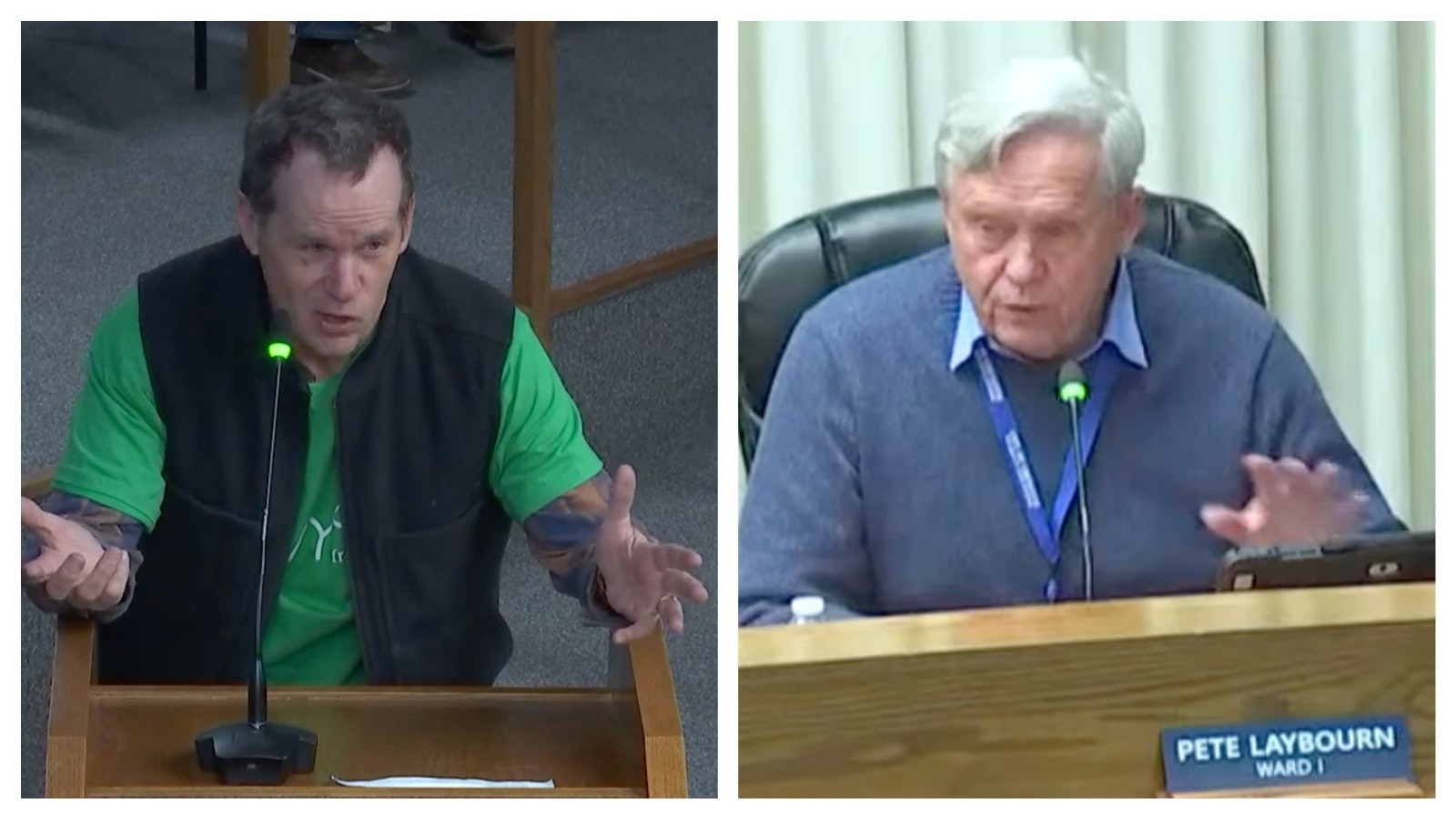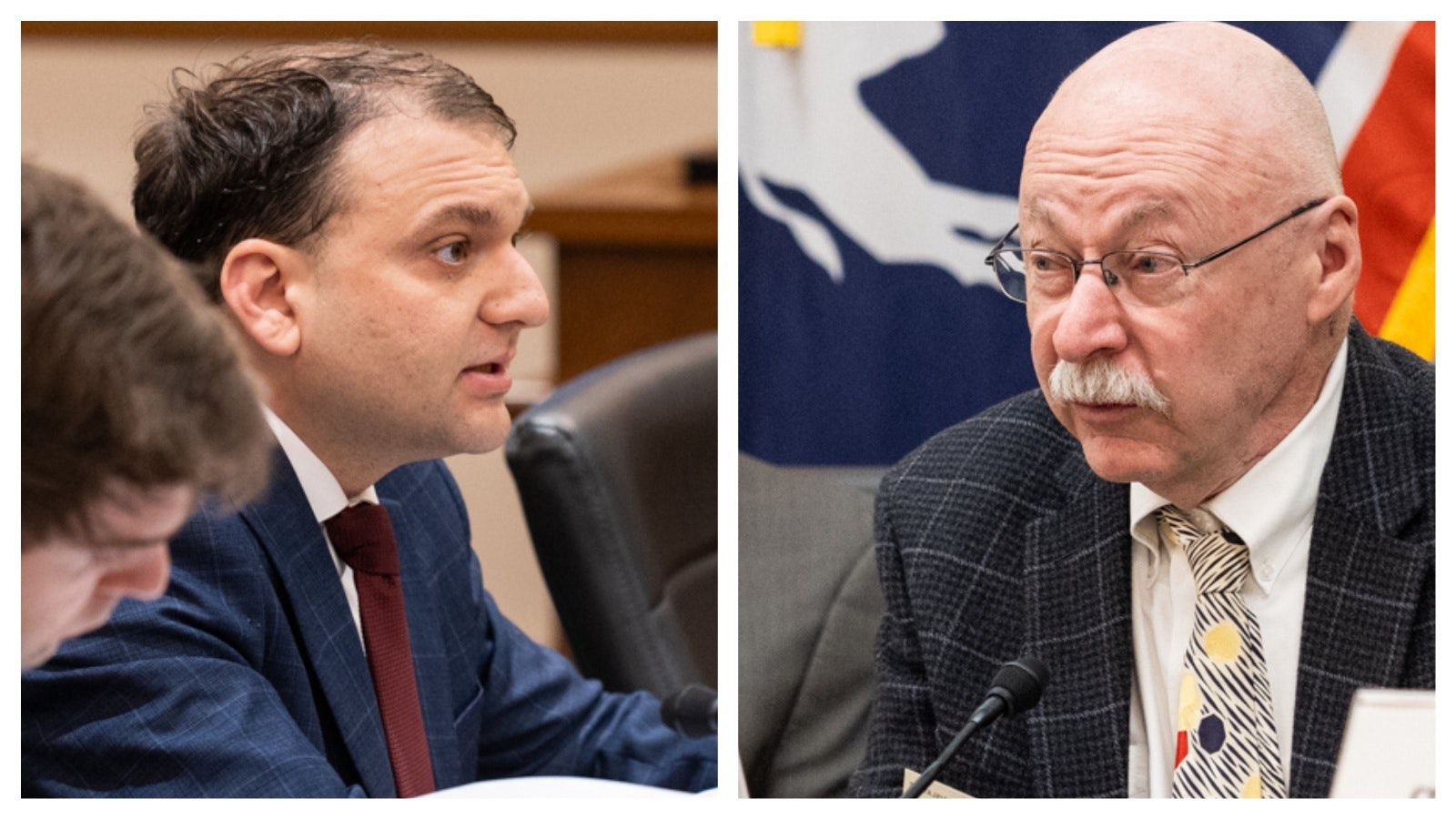When parents across Wyoming complained to her last year about sexually graphic books in schools, state Superintendent of Public Instruction Megan Degenfelder was skeptical, she said Wednesday at a press conference held at the Capitol in Cheyenne.
But parents resounded the same complaints in every corner of the state as she campaigned for her post, Degenfelder said.
So, she started reviewing the books in question.
“And unfortunately, the concerns I heard as I traveled the state were well-founded,” she said. “I’ve now seen materials with my own eyes in different areas of the state, books currently available in school libraries, to minors under the age of consent and paid for by taxpayer dollars, that include graphic depictions of sexually explicit acts.”
In response, Degenfelder gathered a group of school board members, school and business professionals and parents to draft a statewide guidance for school districts searching to beef up their library policies on choosing and weeding sexually graphic books.
Degenfelder unveiled the policy guidance Wednesday ahead of her press conference.
Not For ‘Banning’
The guidance is not a mandate, but an optional template, Degenfelder said, adding that the guidance isn’t a “banning” policy.
“Any book that a local community determines should be removed from a K-12 library … will still be easily found for purchase in the marketplace or even in some taxpayer (funded) public libraries,” she said.
Degenfelder and her communications director, Linda Finnerty, offered excerpts from some of the controversial books for attendees to review. Those included excerpts from “Let’s Talk About It!” a sex guide that inflamed the Lander community this spring and prompted the adoption of a new book-weeding policy in its school district.
The superintendent said she would not wave the excerpts around during the press conference because it would create alarm and spectacle.
“If it is so wildly inappropriate for a pub press conference, then I ask why we have it available in our schools?” she continued. “This graphic, sexually arousing material is why parents are upset and concerned. This type of material has no place in schools, not even one.”
Targeting Sex Acts, Not Viewpoints
Degenfelder said the goal of having state guidelines is not to discriminate against people for their gender identity or sexual orientation.
The guidance itself repeats this, noting that for governments to discriminate against one type of expression due to its viewpoint alone violates the First Amendment.
Degenfelder theorized that to include sexually explicit books in schools damages the chances of staff securing a tolerant learning environment.
“Our schools should support all students in their journey toward academic achievement,” Degenfelder said. “Graphic, sexual material in any form does nothing to advance that mission and ultimately distracts from it, and costs us the confidence of parents in our state.”
Question And Answer
Degenfelder also engaged with reporters Wednesday.
In response to a Cowboy State Daily question, she declined to opine on whether the guidance can help schools avoid stumbling into lawsuits, but said its vast stakeholder input and concrete definitions — including a definition for sexual conduct depictions in books — can help schools tackle the issue.
Another reporter saying that “nearly every middle and high school student in Wyoming has a smartphone with internet access,” asked Degenfelder why it’s “so important to regulate library books?”
Degenfelder said she wouldn’t argue that today’s students are questioning or intrigued by sexuality and intimacy. But it’s not the state’s place to gratify students’ sexual interests.
“What we’re saying today is, ‘What should we, as a taxpayer (funded) public school, what should we be including in our libraries?’” said Degenfelder, adding that “sexually explicit, graphic content just isn’t it.”
A reporter asked what impact Degenfelder’s new guidance might have had on a book controversy community members waged in Gillette recently for about two years regarding the town’s public library.
Degenfelder said she will not focus on public libraries; only schools.
Yet another reporter asked where Degenfelder’s office draws the line between sex education and other materials.
Degenfelder referred that reporter to the definitions section in the guidance. She then added that “sexually arousing (depictions), stimulation of the genitals (are) far beyond the bounds of our health and sexual health standards.”
The Think Tank
Saying they did not always agree with each other but their input was vital, the superintendent thanked her panel of stakeholders who collaborated to build the guidance.
Those are:
- Jay Curtis, superintendent of Park County School District #1
- Maggie Unterseher, a Weston County School District librarian
- Taylor Jacobs, a Wyoming State Board of Education member and a Lander local district school board member
- Amber Pollock, a business owner and former teacher from Casper
- Christy Klaassen, a district school board member from Cheyenne
- Ashlee Fischer, a parent from Gillette
- Mark Lenhardt, a teacher from Rock Springs
- Kathy Scigliano, a parent from Cheyenne
- Mark Broderson, Crook County School District superintendent
- Jeff Wallace, a Cheyenne businessman
What About That Guidance
Dispatched publicly 30 minutes before Degenfelder’s press conference, the library policy guidance is 13 pages long and covers themes like book selection, book challenges, weeding and restriction.
It emphasizes parental involvement in all of those phases.
The guidance urges school districts to consult their attorneys while rewriting library policies and to address all phases of the topic. It also asks librarians to consider book inclusion requests from people who have read the books they’re proposing.
It offers numerous options for handling sexually explicit books, from disallowing them in the first place to moving them to a school that serves higher grade levels to putting them on an opt-in list to removing them.
“A robust policy could include a provision that expressly prohibits some of the defined material, such as material that includes sexually explicit content,” says the guidance. Districts can adopt definitions or a rating system to stay consistent on what sexually explicit content is, the guidance continues.
You’ll Know It When You See It
Sexually explicit content contains sexual conduct, says a definitions section Degenfelder’s office listed in the guidance.
Sexual conduct depictions include real or simulated/animated depictions of any of the following, according to the definitions:
- Masturbation or lewd exhibition of genitals, pubic areas, anus or female nipples.
- Sadomasochistic abuse including flagellation, binding or torture involving underclad or nude people.
- Touching or fondling of the bodily areas listed above, and between animals or humans, or humans and animals.
- Stimulation by any device of a human genital organ.
- Sex acts between humans, animals or animals and humans.
Weeding In Cheyenne
The guidance features a couple of models for weeding sexually graphic books.
One of those offerings is language from the Laramie County School District No. 1 draft policy. It says parents or guardians can nominate materials as sexually explicit and submit a challenge to the school principal. The district shall maintain a list of all materials nominated and publish that list online.
A district committee that has at least one parent on it, along with other stakeholders, can review the book and recommend its fate to the district superintendent. The superintendent then will make a final determination on the book’s fate, and inform the elected school board.
A person dissatisfied with the outcome can appeal to the board. The board then would hold a hearing to determine whether the committee and superintendent followed the outlined process and whether there was sufficient evidence bolstering the outcome, says the policy.
Even if a book survives a challenge, it remains on a list for having been nominated. The district must notify parents and guardians yearly about the existence and location of both nominated materials, and the materials flagged as sexually explicit, the draft says.
Parents can opt their children out of that list or any part of it, the draft policy says.
Books flagged as sexually explicit must be removed from elementary and junior high schools and placed in a high school. If they were in a high school in the first place, the books must be put on the sexually explicit book list.
Weeding In Powell
Another offering is language from Park County School District No. 1’s policy.
Challengers under that policy can ask for books to be removed. The challenger, principal and librarian or teacher will meet to discuss the request. The principal is instructed to take down a written account of that meeting and give it to the district superintendent.
The principal then can choose to restrict the challenger’s students from accessing that book or restrict access for all students unless parents give permission for their students to access that book, or transfer the book to a school serving higher grade levels.
If the challenger still wants the book removed after the principal makes that decision, he or she can ask for a reconsideration committee to review the book and decide its fate. That committee must include the challenger, and it can’t include immediate family members or household members of district employees or schoolboard members.
If the book seems harmful, the superintendent can remove it from the school’s shelves temporarily while the reconsideration process is ongoing.
School staffers and reconsideration committees alike are to use the district’s content rating system during book weeding.
Notably, books that fall into category No. 5, the highest under the content rating system, will not be allowed in any district library or classroom. The category includes books with explicit sexual nudity; books depicting sexual activities including anal, oral, vaginal intercourse, fingering, anilingus or ejaculation; or books that are profoundly pornographic.
Opting Out In Cheyenne
Laramie County School District No. 1 also has a draft of an access policy that Degenfelder included in her policy guidance. The district’s proposed access options for parents include the following choices:
- Restrict your student from accessing sexually explicit content and books that have been nominated for review as sexually-explicit content.
- Make a tailored list of books your student can access.
- Let your student access anything.
- Let your student access no school library materials.
Clair McFarland can be reached at clair@cowboystatedaily.com.





